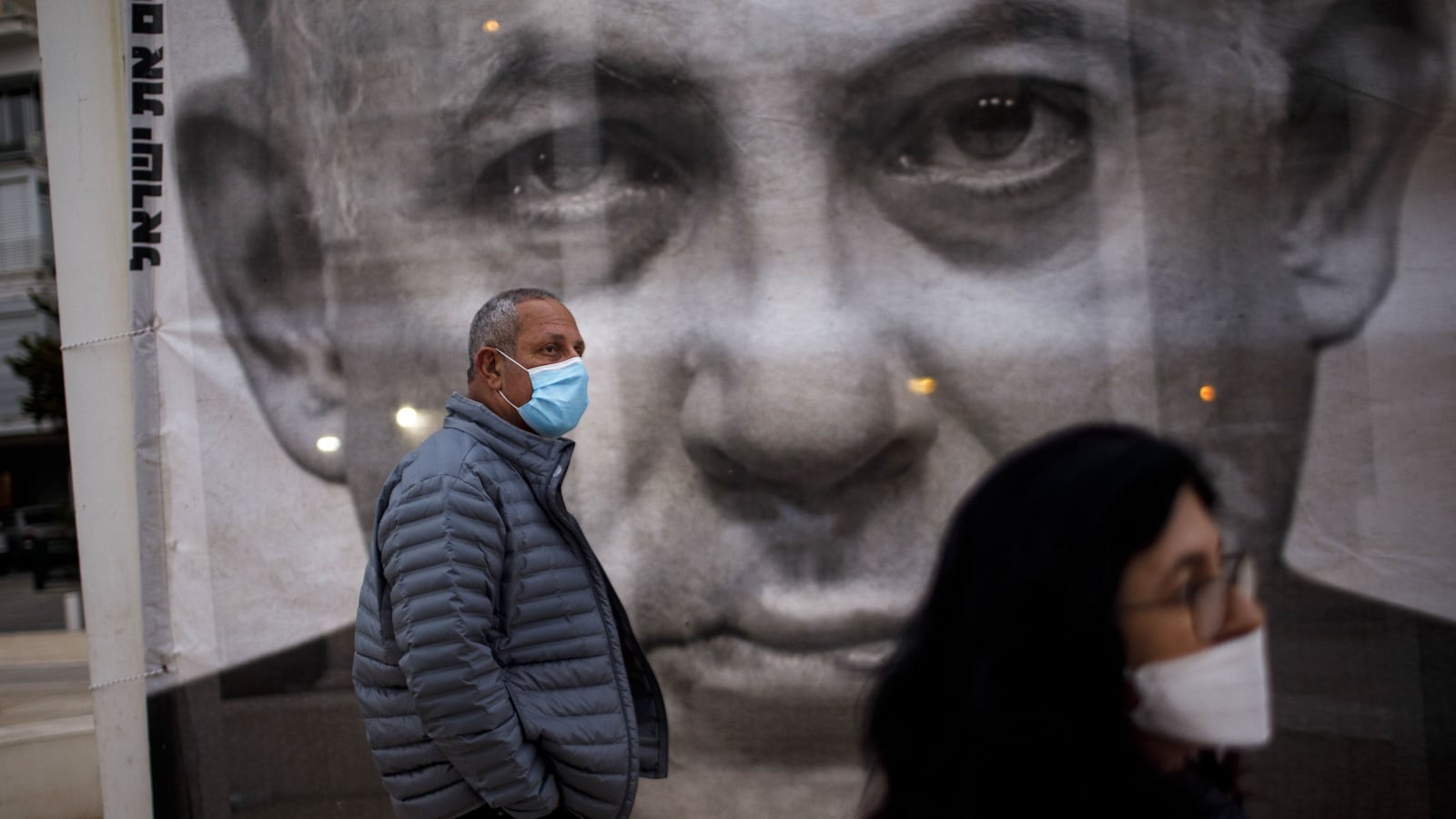TEL AVIV–After three inconclusive elections in the past year, Israel’s political impasse came to a merciful resolution this week with a power-sharing agreement between Prime Minister Benjamin Netanyahu and his main rival, former military chief Benny Gantz.
The coalition deal reached is, even by the low standards of Israeli politics, convoluted and unprecedented, with each individual set to serve for 18 months as prime minister, among a slew of other clauses and legalese. But Netanyahu, often nicknamed “the magician,” will of course be going first, marking a dramatic resurrection since last fall for a politician still facing three serious corruption indictments.
In the process, Netanyahu managed to force Gantz into a humbling volte-face on his central election pledge—“just not Bibi”—and smashed the opposition into pieces. By agreeing to sit in government with Netanyahu, Gantz’s Blue and White party has also implicitly shielded the long-serving premier from any legal challenges to his continued rule. The annexation of West Bank settlements, per the agreement, looms as early as this summer.
As recently as four months ago things looked very different. Coming out of the second election round in September of last year, Netanyahu had lost some 300,000 right-wing voters relative to the initial April ballot. His own handpicked attorney general formally indicted him on bribery, fraud, and breach of trust charges in late November, removing any question about whether Netanyahu was indeed going to trial. A few weeks later, a popular former minister would challenge Netanyahu for leadership of the Likud party.
Forcing a third round of elections (as he did) was the best out of all the bad options available to Netanyahu back then—hoping for an electoral miracle that would extricate him from his legal troubles. Headlines touting “the end of the Netanyahu era” proliferated, while the foreign press began writing his political obituaries.
Yet slowly but surely things began to turn. In late December, Netanyahu won the Likud leadership primary in a landslide, proving to all that no matter what transpired his political base wouldn’t desert him. This was also the time period where the imperial “King Bibi” came down from his official Jerusalem residence and reconnected with the common folk, holding nightly Trump-style rallies across the country replete with supporters on stage as backdrop and extemporaneous musings on the microphone.
Netanyahu’s momentum continued into the new year and general election, while Gantz’s campaign only truly began in late January. “We must move forward,” Blue and White’s revised campaign slogan read, underwhelming nearly everyone. In reality, Gantz was regressing as a candidate for prime minister in his halting public appearances.
A major assist to Netanyahu came with the unveiling of the Trump administration’s “Deal of the Century” for Israel-Palestine, shifting the focus for the last month of the campaign onto diplomacy and world affairs, Netanyahu’s strong suits. Throughout, Netanyahu and his proxies openly called into question Gantz’s sanity, sexual proclivity, and record as a military officer.
Netanyahu was also “meticulous in driving a wedge between his supporters and Blue and White, and he brought 200,000 voters back,” Yossi Shain, a professor at Tel Aviv University, told The Daily Beast. “Netanyahu is a great campaigner, and he had a very effective message… but he also used nasty, nasty language of hate,” primarily directed at Israel’s Arab citizens.
The third election in early March still didn’t return a clear winner—and certainly not Netanyahu, who along with his right-wing “bloc” of ultra-Orthodox and settler allies again failed to win a parliamentary majority despite gaining seats. Gantz, for his part, failed in a short-lived bid to form a minority government with the external backing of Arab-Israeli parliamentarians; two members of Gantz’s own party scuttled the move, deeming Arab political support anathema.
“Gantz brought rightwing advisers, rightwing Knesset members, rightwing positions. But rightwing voters he wasn’t able to bring,” Channel 13 diplomatic correspondent Barak Ravid said at the time.
Continued deadlock and the prospect of yet another election were in the offing, which is where the coronavirus entered the scene. Netanyahu, still caretaker prime minister, began making near-nightly primetime addresses, warning darkly of millions killed globally and an impending crisis worse than any of Israel’s wars. He called on Gantz to put politics aside and join forces for an “emergency national unity government” to combat the virus.
Remarkably, Gantz acquiesced, agreeing to do what he had vowed he’d never do: sit in government with Netanyahu as prime minister. “These are unusual times and they call for unusual decisions,” Gantz explained.
The decision tore apart the Blue and White party—a centrist alliance just over a year old, formed for the sole purpose of toppling Netanyahu. Gantz’s partners in the Blue and White leadership, former Finance Minister Yair Lapid and former Defense Minister Moshe Ya’alon, remained in opposition (former military chief Gabi Ashkenazi, the fourth member of the party leadership, went with Gantz).
“Benny Gantz surrendered without a fight and crawled into Netanyahu’s government,” Lapid seethed. Another key figure in the anti-Netanyahu camp, former Defense Minister Avigdor Lieberman, was even more blunt: “Gantz has a lot of credit, but he doesn’t understand anything about politics.… We can begin referring to him in the past tense.”
In truth, Gantz didn’t have many good options—and the risk of yet another election at the helm of a rump party was among the worst. Netanyahu’s poll numbers were only rising amid a nationwide coronavirus lockdown and other emergency decrees; in a time of historic upheaval, polls have consistently shown majority support for Netanyahu’s handling of the crisis and the need for a unity government. After three weeks of tortuous negotiations, Gantz’s capitulation was made official Monday night when the deal with Netanyahu was finalized.
“It was said of the American political system, it was designed by geniuses so it could be run by idiots. When it comes to the Israeli political system, you can say it was designed by idiots and you need to be a genius to run it,” Jonathan Rynhold, a professor at of Bar-Ilan University, told The Daily Beast even prior to the agreement. The 14-page document signed by Netanyahu and Gantz appears, for all the world, like the ratification of this axiom.
Among its many novelties is the creation of the post of “Alternate Prime Minister” whereby Netanyahu and Gantz will both be sworn in at the same time. If Netanyahu fails to uphold the premiership rotation deal and hand the reins to Gantz after 18 months, then new elections will be triggered, with Gantz taking over anyway as caretaker prime minister. There is nothing in the agreement, however, stopping Netanyahu from toppling the government one day after Gantz becomes prime minister.
If the Supreme Court finds it within itself to disqualify Netanyahu from serving due to his criminal indictments, then new elections will be triggered automatically. Most analysts view such an outcome as extremely unlikely given Gantz’s acquiescence and the future government’s broad base of support (at least 72 out of 120 Knesset members).
A package of legislation still needs to be passed to make the agreement legally palatable. “We’re reinventing our constitution for this ad hoc situation,” Yohanan Plesner, president of the Israel Democracy Institute, a non-partisan think-tank, told The Daily Beast.
In ministerial terms the coming government will be the biggest in Israeli history, with over 30 ministers and possibly a dozen more deputy ministers divided evenly between Netanyahu and Gantz’s respective camps. A sub-clause states that even the alternate prime minister will receive an official residence and full perks—at a time when unemployment has ballooned to 25 percent, and in a government whose primary (stated) goal is to tackle the coronavirus crisis.
Aside from the pandemic, there is “no substantive policy agenda [in the agreement], but just a lot of mechanisms for sharing power and vetoing each other,” Plesner explained. “They have decided not to decide.”
This is likely due to the fact that Gantz already acceded to the issues most vital to Netanyahu.
Per the agreement, Netanyahu will hold de facto veto power over the appointment of judges, raising the prospect he could choose who will sit in judgment of him if an appeal reaches the Supreme Court. The entire legal process could take years to play out until such a decision is reached—and in the interim, with Gantz’s blessing, Netanyahu will have already set a precedent for serving as prime minister while on trial.
In addition, the agreement waters down the quota for the conscription of ultra-Orthodox males into the military, a highly sensitive problem touching on relations between synagogue and state. Most perniciously, though, the sole policy issue outlined in detail is the annexation of settlements in the West Bank—which Netanyahu can bring to a Knesset vote irrespective of Gantz’s wishes as early as July 1. The only condition placed on this move is the agreement of the Trump administration. Right-wing Israeli politicians have for weeks been championing the “historic window of opportunity” available to them to make this happen before the U.S. general election in November and a possible Biden administration.
Palestinian and international officials have already warned about the fallout of any such Israeli step, which could be the death-knell to any negotiated two-state solution to the Israeli-Palestinian conflict. “No Palestinian leadership exists that can sit down with an Israeli government after annexation,” one senior Palestinian official in Ramallah told The Daily Beast on Monday night. Taken to its logical conclusion, it could spell the end of Israel as both a Jewish and democratic state.
For Gantz, his main pitch to the public is that he helped avert a dreaded fourth election and will work to keep the Israeli right’s most extreme anti-democratic impulses in check. There is, too, the ongoing coronavirus crisis to handle. But on balance, the deal as outlined is nothing short of a sweeping Netanyahu victory. After three generals joined forces to topple him, after three elections that he failed to win, and after three corruption indictments, Netanyahu remains prime minister.
“Bibi is a once in a generation leader, he was chosen by God to lead the Jewish nation,” one hardcore supporter told me at a Likud campaign event in early 2019, during the first election round. After a plague of biblical proportions paved the way for his main rival’s surrender, even the non-believers in the Holy Land have to at least start wondering.





